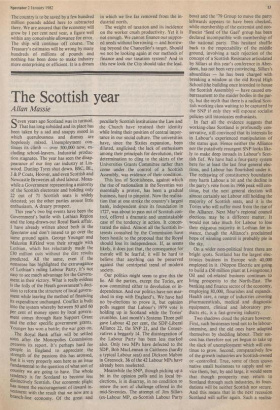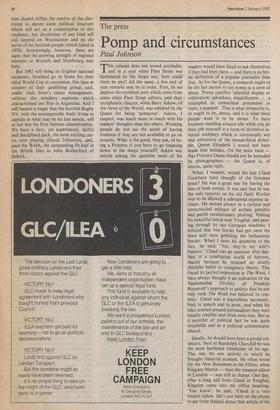The Scottish year
Allan Massie
Q even years ago Scotland was in turmoil.
That has long subsided and its place has been taken by a sad and snappy mood in which querulousness and dismay are hopelessly mixed. Unemployment con- tinues its climb — over 300,000 now, ex- cluding school-leavers. Industrial produc- tion stagnates. The year has seen the disap- pearance of our tiny car industry at Lin- wood. Dunlop Tyres shut down. BSC, BL, J & P Coats, Hoover, and even Scottish and Newcastle Breweries all shed labour. Mean- while a Government representing a minority of the Scottish electorate and holding only 22 out of 71 Scottish seats is widely detested; yet the other parties arouse little enthusiasm. A dreary prospect.
This year's two big events have been the Government's battle with Lothian Region and the long-drawn-out Royal Bank affair. I have already written about both in the Spectator and don't intend to go over the same ground again. George Younger and Malcolm Rifkind won their struggle with Lothian, which has reluctantly made the £30 million cuts without the dire results predicted. All the same, even if the nonsense has highlighted the extravagance of Lothian's ruling Labour Party, it's not easy to see much advantage for the Govern- ment in their victory. What is really evident is the folly of the Heath government's deci- sion to reform the structure of local govern- ment while leaving the method of financing its expenditure unchanged. Conflict is built into the system whereby between 50 and 60 per cent of money spent by local govern- ment comes through Rate Support Grant and the other specific government grants. Younger has won a battle; the war goes on.
The Royal Bank affair will be settled soon after the Monopolies Commission presents its report. It's perhaps hard for people in England to appreciate the strength of the passions this has aroused, but it is very properly seen here as an issue fundamental to the question of what sort of country we are going to have. The whole tendency is for Scotland to become less distinctively Scottish. Our economic plight has meant the encouragement of inward in- vestment with the result that we now are a branch-line economy. Of the great and
peculiarly Scottish institutions the Law and the Church have retained their identity while losing their position of central impor- tance in our social culture. The universities have, since the Sixties expansion, been diluted, anglicised; the lack of enthusiasm among their principals for devolution, their determination to cling to the skirts of the Universities Grants Committee rather than come under the control of a Scottish Assembly, was evidence of their condition.
This loss of Scottishness, against which the rise of nationalism in the Seventies was essentially a protest, has been a gradual business, hard to pinpoint. Now the realisa- tion that at one stroke the country's largest bank, independent since its foundation in 1727, was about to pass out of Scottish con- trol, offered a dramatic and unmistakable case of the tendency in action. It concen- trated the mind. Almost all the Scottish in- terests consulted by the Commission have been hostile to the proposal that the Royal should lose its independence. If, as seems likely, it does just that, the consequence for morale will be fearful; it will be hard to believe that anything can be preserved against that centripetal trend of modern society.
Our politics might seem to give this the lie. All the parties, except the Tories, are now committed either to devolution or in- dependence. And our politics have not mar- ched in step with England's. We have had no by-elections to prove it, but opinion polls suggest that Labour's 1979 vote is holding up in Scotland while the Tories' crumbles. Last month's Systems Three poll gave Labour 42 per cent, the SDP-Liberal Alliance 22, the SNP 21, and the Conser- vatives a beggarly 14. The disintegration of the Labour Party has been less marked also. Only two MPs have defected to the SDP, Bob MacLennan in Caithness (hardly a typical Labour seat) and Dickson Mabon in Greenock. 36 of the 42 Labour MPs have already been reselected.
Meanwhile the SNP, though picking up a bit in the opinion polls and in local by- elections, is in disarray, in no condition to renew the sort of challenge offered in the mid-Seventies. The attempt of Jim Sillars (ex-Labour MP, ex-Scottish Labour Party boss) and the '79 Group to move the party leftwards appears to have been checked, while membership of the extremist and neo- Fascist 'Seed of the Gael' group has been declared incompatible with membership of the national party. This hesitant shuffle back to the respectability of the middle ground, involving a tacit rejection of the concept of a Scottish Resistance articulated by Sillars at this year's conference in Aber- deen, has not been very convincing. Sillars's absurdities — he has been charged with breaking a window at the old Royal High School (the building once intended to house the Scottish Assembly) — have caused em- barrassment to the staider bodies in the par- ty, but the myth that there is a radical Scot- tish working clasS waiting to be captured by the SNP if only they will espouse socialist policies still intoxicates enthusiasts.
In fact all the evidence suggests that working-class Scotland is profoundly con- servative, still convinced that its interests lie in Labour's experienced manipulation of the status quo. Hence neither the Alliance nor the putatively resurgent SNP looks like- ly to make deep inroads in Labour's Scot- tish fief. We have had a four-party system here for at least the last four general elec- tions, and Labour has flourished under it. The redrawing of constituency boundaries may harm Labour a bit and the decline in the party's vote from its 1966 peak will con- tinue, but the next general election will almost certainly see Labour still holding the majority of Scottish seats, and it is the Tories who will suffer most from the rise of the Alliance. Next May's regional council elections may be a different matter. It would not take much for Labour to lose their exiguous majority in Lothian for in- stance, though the Alliance's proclaimed hope of winning control is probably pie in the sky.
On a wider non-political front there are bright spots. Scotland has the largest elec- tronics business in Europe with 40,000 employed in it. (Nippon Electric are going to build a £50 million plant at Livingstone.) Oil and oil-related business continues to bring prosperity to the North-East. The banking and finance sector of the economy, employing 80,000, flourishes and expands. Health care, a range of industries covering pharmaceuticals, medical and diagnostic equipment, clinical and laboratory pro- ducts etc, is a fast-growing industry.
Two shadows cloud the picture however. First, such businesses tend not to be labour- intensive, and the old ones have adapted themselves by shedding labour. Their suc- cess has therefore not yet begun to take up the slack of unemployment which will con- tinue to grow. Second, comparatively few of the growth industries are Scottish-owned or -controlled. True, some of them spawn native small businesses to supply and ser- vice them, but, by and large, it would seem that though prosperity may return to Scotland through such industries, its foun- dations will be neither Scottish nor secure. And this means that in the next recession Scotland will suffer again. Such a realisa- tion should stiffen the resolve of the elec- torate to secure some political structure which will act as a counterpoise to this tendency, but devolution of any kind will still depend on Westminster and on the nerve of the Scottish people (which failed in 1979). Interestingly, however, there are signs that the growing strength of regional interests at Brussels and Strasbourg may help.
But 1982 will bring its brighter national moments. Scotland go to Spain for their third World Cup in succession, this time as winners of their qualifying group, and, under Jock Stein's canny management, without the mindless euphoria which characterised our flop in Argentina. And I will hazard a wager that the Scottish Rugby XV, with the incomparable Andy Irvine as captain in what may be his last season, will at last win the Five Nations championship. We have a fiery, yet experienced, skilful and disciplined pack, the most exciting cen- tre now playing (David Johnston), and, pace the Welsh, the outstanding fly-half in the British Isles in John Rutherford of Selkirk.



































 Previous page
Previous page